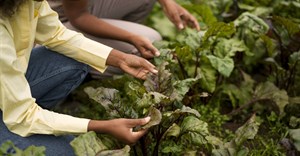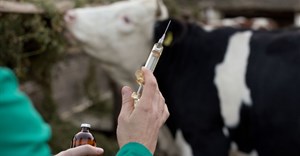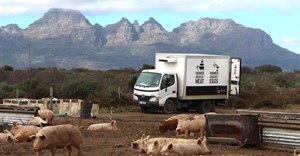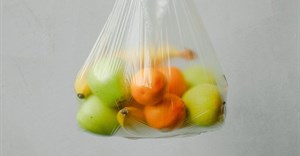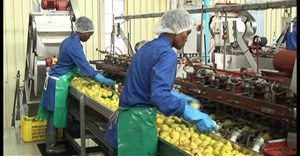Green, integrated approaches could address food security challenges
Marking World Food Day on 16 October, Dain Richardson, fdt Africa senior exhibition manager, says: "In an age of such dramatic progress in science and technology, the fact that over 870 million people in the world are hungry is inexcusable. Collectively, we have the means to address global warming and to produce enough nutrition, sustainably, to feed all the world's people."

Dr. Werner Rossouw, President of the Agri-Laboratory Association of Southern Africa (AgriLASA), and senior manager and laboratory head at Trifert notes that establishing nutritional security must include efforts to address problems of contaminated water, the disposal of human and household waste, poor food and personal hygiene in homes and places of food processing and marketing .
"Food safety and quality, secured through effective food quality control at all stages of production, processing and handling will contribute to improvement of nutritional well-being. Improved access to resources (e.g. income generating opportunities), labour saving technologies (e.g. appropriate farming practices), infrastructure and proper basic education, in many instances could vastly improve community development and contribution to food production and distribution."
Future systems
A future food system will have to function differently to some of the current processes and practices, Rossouw says. “With urbanisation on the rise, people are less aware of how food is produced and are localising in urban areas where food is not necessarily produced. Therefore, the need to establish and create better processing/storage technologies, improving and maintaining basic infrastructure, establishing efficient distribution channels, and utilising open trade policies would be key to future food and nutritional security.
"Farmers and primary producers will also have to rely more on science-based solutions to help them increase yields and sustain these more demanding production practices. Not considering improved seed varieties and crop protection tools, other technologies such as modern irrigation practices, crop management strategies, mobile technology, fertilizer as well as accurate/ high throughput laboratory analysis methods/technologies will stand to contribute/achieve more sustainable agriculture systems and continuous improvement and less resource use."
Rossouw goes on to say that the Covid-19 crisis overturned global food supply and illustrated that the current food system will need to be improved upon.
"The answer is to produce healthy, nutritious food using natural, regenerative, soil supporting growth practices and resources. Any waste or by-products should then be used to generate new food or contribute to integrative industries such as fermentation/brewing and even bioenergy, etc. The biggest underlying challenge here will continue to be access to clean, renewable water resources as basis.
"Perhaps the solution could be postulated that trends to localise or sectorise agriculture, where resources of local ecosystems be used to feed their communities be considered as opposed to the current mass production and distribution model."
He says that measures to improve this system could include preventing food wastage as much as possible at farm level, Governments promoting and aiding in creating resilient local food systems, promoting and leveraging emerging technologies within the supply chain, empowering consumers to change consumption patterns and integrating industries and processes to add value to waste as much as possible.
Managing waste and going circular
Benoît Le Roy, IFAT Africa advisory board member and founding member & CEO of the South African Water Chamber NPC and Enviro-One, says the old linear ways are no longer adequate for feeding the world. "We have to address issues like sustainable production and waste, and move to a more circular economy."
Le Roy says it is estimated that the higher LSMs waste around a third of their food. On top of that, food manufacturers waste vast amounts of nutrients, and tonnes of food and organic waste ends up in landfills. He notes that South Africans produce around 60 million tonnes of household waste a year, of which 50 – 60% is biodegradable.
"With a circular approach, we can either convert safely usable nutrients into food, or we could use organic waste for energy and compost in order to produce food more sustainably. It is very likely there are enough resources on the planet to feed everyone in a dignified way, but not if we continue to take a linear approach."
To move toward a circular economy, Le Roy says efforts have to be made by a broad value chain, including water, power and food production – right through to the end consumer.
"One challenge is that large manufacturers are reluctant to invest in waste reduction right now. There is no enforcement of legislation to curb food waste and no control over what is going into landfills," he says. "There should be a bigger general drive to stop organic waste from going into bins, and society can drive a lot of that change."
Fostering collaboration
Richardson notes: "The international Food and Agriculture Organization (FAO) recently called for increased private sector participation in achieving the Sustainable Development Goals, and we at Messe Muenchen South Africa believe this will be key to the success of efforts to overcome world hunger. We have observed that our own global event partners and exhibitors have all the advanced technologies necessary to produce food more sustainably and cost effectively, across the value chain including water, energy, waste management and science."
The challenge, she says, will be to drive collaboration between all stakeholders in all of these value chains. "This is something we in our small way are striving to achieve by bringing together three key industries at a single trade event in South Africa next year. This concept was revolutionary when it was first introduced, but has since proven to be a unique and valuable opportunity for stakeholders in seemingly disparate industries to collaborate.”
Messe Muenchen has also added a renewable energy pavilion to IFAT Africa, so bringing together leaders across the water-waste-science -processing-energy arena. "All of these sectors play a key role in producing food more efficiently and sustainably," notes Richardson. "It starts with more efficient utilisation of scarce water resources, and includes technology-enabled farming and food processing, energy efficient processes, reduction of waste in food production and advanced analytics capability to maintain standards and support innovation."
food & drink technology Africa (fdt Africa), which presents food & drink manufacturing solutions from innovative developments for resource conservation to raw materials, through to processing, filling and packaging machines, will be co-located with IFAT Africa at the Gallagher Convention Centre from 13-15 July 2021








